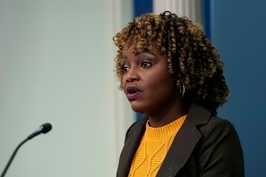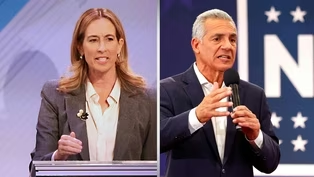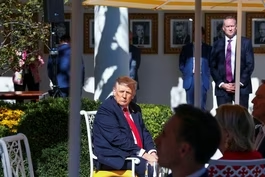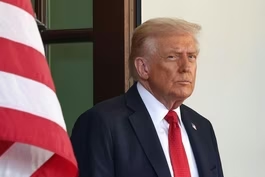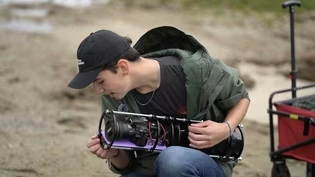
Another university declines Trump's offer for funding
Clip: 10/21/2025 | 6m 20sVideo has Closed Captions
Another university declines Trump's offer for priority funding
Several colleges and universities are pushing back on pressure from the Trump administration. The president offered nine schools priority access to federal funding if they signed an agreement to meet his demands. So far, seven schools have rejected the deal. Amna Nawaz discussed more with Ted Mitchell, president of the American Council on Education.
Problems playing video? | Closed Captioning Feedback
Problems playing video? | Closed Captioning Feedback
Major corporate funding for the PBS News Hour is provided by BDO, BNSF, Consumer Cellular, American Cruise Lines, and Raymond James. Funding for the PBS NewsHour Weekend is provided by...

Another university declines Trump's offer for funding
Clip: 10/21/2025 | 6m 20sVideo has Closed Captions
Several colleges and universities are pushing back on pressure from the Trump administration. The president offered nine schools priority access to federal funding if they signed an agreement to meet his demands. So far, seven schools have rejected the deal. Amna Nawaz discussed more with Ted Mitchell, president of the American Council on Education.
Problems playing video? | Closed Captioning Feedback
How to Watch PBS News Hour
PBS News Hour is available to stream on pbs.org and the free PBS App, available on iPhone, Apple TV, Android TV, Android smartphones, Amazon Fire TV, Amazon Fire Tablet, Roku, Samsung Smart TV, and Vizio.
Providing Support for PBS.org
Learn Moreabout PBS online sponsorshipAMNA NAWAZ: A number of colleges and universities## are pushing back on pressure# from the Trump administration.
Earlier this month, the president offered nine# schools priority access to federal funding if## they signed a deal called the Compact for# Academic Excellence in Higher Education.## It includes demands like eliminating diversity,# equity and inclusion policies, prohibiting## anything that would -- quote -- "punish, belittle,# or even spark violence against conservative## ideas," shrinking foreign student enrollment, and# freezing effective tuition rates for five years.
But, so far, the University of Arizona, USC,# Brown University, Penn, Dartmouth College,## MIT, and the University of Virginia have all# rejected the deal.
The University of Texas at## Austin and Vanderbilt University# haven't yet publicly weighed in.
For a closer look, I'm joined now# by Ted Mitchell.
He's president of## the American Council on Education.
That's a# nonprofit U.S.
higher education association.
Ted Mitchell, welcome to the "News# Hour."
Thanks for joining us.
TED MITCHELL, President, American Council# on Education: Thanks for having me.
AMNA NAWAZ: Let's just begin with your reaction# .. out this letter.
What did you make of it and# the terms that it entailed when you saw it?
TED MITCHELL: Yes, many of us were very# appalled by the letter in a couple of ways.
First, it's a major intrusion into the# decision-making of higher education## institutions.
Fundamental to that are who we# teach, who teaches, what we teach and all of those## were a part of the Trump deal.
Essentially,# universities were asked to cede responsibility## for those to the federal government in# exchange for an odd on federal grants,## which is the second problem, is that federal# grants should always be given on the basis## of merit, not on the basis of political# ideology or on the basis of agreeing with## a government, whether it's a Democrat# government or a Republican government.
AMNA NAWAZ: So, by the sound# of it, it's not like you would## actually advise any of these schools# to sign it.
Is that what I'm hearing?
TED MITCHELL: I think it's a# terrible idea for the institution,## and I think it's a terrible idea# for American higher education.
AMNA NAWAZ: So, in terms of what we're# seeing right now, we should remind folks,## this has been part of a broader pressure# campaign by the Trump administration.
We## know they launched over 100 investigations into# K-12 schools and higher education universities.
But, so far, we have seen some universities# agree, for example, to change their leadership.## Or we have seen settlements, for example, from# universities like Brown and Columbia and UPenn,## reportedly one in the works with# the University of Virginia as well.
The fact that schools are# now rejecting this letter,## does that say to you there's# been some shift in the landscape?
TED MITCHELL: No, I think that there's# just been a clearer recognition among## institutions of where the bright red lines are,# lines that a federal government shouldn't cross,## lines that actually would make# institutions instruments of the state,## rather than institutions seeking truth,# seeking innovation, academic discoveries.
All of that's at risk here if institutions# become simply instruments of state policy,## again, whether that's a Democrat# policy or a Republican policy.
AMNA NAWAZ: Are there any parts of the# letter that stand out to you as points## on which the schools should negotiate or# should consider?
I'm thinking specifically## about the tuition freeze.
The demands# in this letter say the signatories have## to commit to freezing tuition rates for# U.S.
students for the next five years.
That feels like something a lot of people# can get behind regardless of their politics.
TED MITCHELL: Yes, as the father of a couple# of recent college graduates, I get it.
I think that the word that's important and that is# negotiate with the government.
I don't think that## these are matters to negotiate with the government# about.
Is affordability an issue?
Absolutely,## it's an issue.
Should we do everything we# can to constrain prices and cost?
Absolutely.
And I think the deal that the government# has presented is about having the government## dictate that.
And we think that that's wrong.# And I think our colleagues across the country## agree with us.
Now, there are a# number of things that are pointed out## in the compact that are things that# we have been working on for years.
We have been clearly working on trying# to create ideological diversity in the## faculty.
I think it's wrong to point out# the protection of just conservative views.## I think all views need to be protected.# I think cancel culture is wrong whether## it comes from the left or the right.# That's something we take seriously.
But things like capping international student# enrollment, I think that goes too far.
Demanding## that institutions use a standardized test# to make all of their admissions decisions,## I think that that runs into all that we know about# the inequality of K-12 education in this country.
So I think there are plenty of things# in the compact that we need to work## on together, but we need to do it# in partnership, not with a deal.
AMNA NAWAZ: Can I ask you about that foreign# enrollment cap, though?
Because they're## proposing a 15 percent cap as a percentage# of the student body.
The argument there,## as I'm sure you have heard, is# that are fewer foreign students,## that they would admit more U.S.# students.
Is that a wrong assumption?
TED MITCHELL: It is because one forgets in that# assumption that the international students,## in addition to providing great diversity# of opinion and background on our campuses,## they often pay, most often, most# often pay full tuition.
So in fact,## international students subsidize# low-income domestic students.
AMNA NAWAZ: So, on the issue of whether# or not schools should sign this, so far,## we have seen rejections.
Do you worry# what will happen if one school does## decide to sign on?
Does that create more# pressure for other schools to follow?
TED MITCHELL: I don't think so.
I think that every institution.. context and their own needs.
But I do believe# that institutions are voicing their concern with## this idea of, well, this federal overreach that# has clearly crossed some lines for all of us.
AMNA NAWAZ: All right, that is Ted Mitchell,## president of the American Council# on Education, joining us tonight.
Ted Mitchell, thank you for your time.
TED MITCHELL: Thank you.
Barghouti’s son on his quest for Palestinian statehood
Video has Closed Captions
Clip: 10/21/2025 | 8m 12s | Marwan Barghouti’s son on the quest for Palestinian statehood and who will lead them (8m 12s)
Karine Jean-Pierre questions two-party system in new book
Video has Closed Captions
Clip: 10/21/2025 | 9m | In 'Independent,' Karine Jean-Pierre says the two-party system isn't working (9m)
The national implications of the New Jersey governor's race
Video has Closed Captions
Clip: 10/21/2025 | 7m 47s | A look at the New Jersey governor's race and its national implications (7m 47s)
News Wrap: No negotiations planned as shutdown hits 21 days
Video has Closed Captions
Clip: 10/21/2025 | 5m 53s | News Wrap: GOP lawmakers signal they will not negotiate with Dems to end shutdown (5m 53s)
Trump's push for peace tested as Putin meeting called off
Video has Closed Captions
Clip: 10/21/2025 | 4m 36s | Trump's push for peace tested as Putin meeting called off and Gaza ceasefire shows cracks (4m 36s)
Withdrawn Trump nominee reportedly said he has 'Nazi streak'
Video has Closed Captions
Clip: 10/21/2025 | 6m 26s | What to know about the withdrawn Trump nominee who reportedly said he has a 'Nazi streak' (6m 26s)
Young photographer documents disappearing salt marshes
Video has Closed Captions
Clip: 10/21/2025 | 3m 27s | Young photographer documents disappearing salt marshes to inspire action (3m 27s)
Providing Support for PBS.org
Learn Moreabout PBS online sponsorship
- News and Public Affairs

FRONTLINE is investigative journalism that questions, explains and changes our world.

- News and Public Affairs

Amanpour and Company features conversations with leaders and decision makers.












Support for PBS provided by:
Major corporate funding for the PBS News Hour is provided by BDO, BNSF, Consumer Cellular, American Cruise Lines, and Raymond James. Funding for the PBS NewsHour Weekend is provided by...

